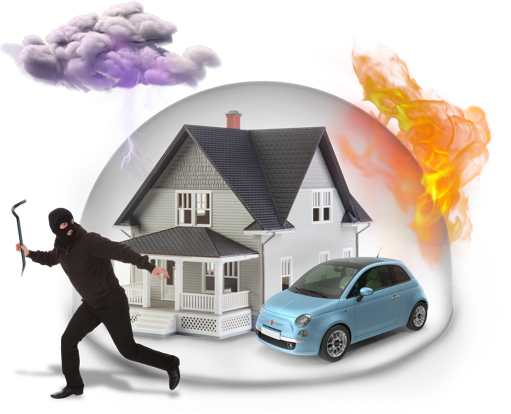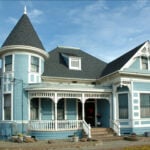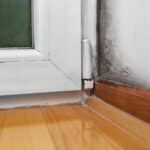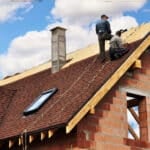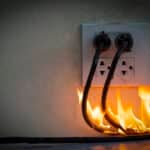The largest, single investment most consumers make is in their homes. The consumer can protect their home, possessions, and liability with a homeowner’s insurance policy. The homeowner’s insurance policy is a package policy that combines more than one type of insurance coverage in a single policy. There are four types of coverages that are contained in the homeowner’s policy: dwelling and personal property; personal liability; medical payment; and additional living expenses.
Property Damage Coverage
Property damage coverage helps pay for damage to your home and personal property. Other structures, such as a detached garage, a tool shed, and any other building on your property are usually covered for 10% of the amount of coverage on your house.
Personal Liability Coverage
Medical Payment Coverage
Additional Living Expenses
Home Business
Home Insurance Tips:
1. Shop around.
It will take some time, but could save you a good sum of money. Ask your friends, check the Yellow Pages, and contact your state insurance commission. The National Association of Insurance Commissioners has information to help you choose an insurer in your state, including complaints that are filed by consumers. States often make information available on typical rates charged by major insurers, and many states provide the frequency of consumer complaints by company. Also check consumer guides, insurance agents, companies, and online insurance quote services. This will give you an idea of price ranges and tell you which companies have the lowest prices. But don’t consider price alone. The insurer you select should offer a fair price and deliver the quality of service you would expect if you needed assistance in filing a claim. So, in assessing service quality, use the complaint information from state regulatory agencies and talk to a number of insurers to get a feeling for the type of service they provide. Ask them what they would do to lower your costs. When you’ve narrowed the field to three insurers, get price quotes.
2. Raise your deductible.
3. Don’t confuse what you paid for your house with rebuilding costs.
4. Buy your home and auto policies from the same insurer.
5. Make your home more disaster-resistant.
6. Improve your home security.
7. Seek out other discounts.
8. Maintain a good credit record.
9. Stay with the same insurer.
10. Review the limits in your policy and the value of your possessions at least once a year.
11. If you are in a government plan, look for private insurance.
12. When you’re buying a home, consider the cost of homeowner’s insurance.
If you have questions about insurance for any of your possessions, be sure to ask your agent or company representative when you’re shopping around for a policy. For example, if you run a business out of your home, be sure to discuss coverage for that business. Most homeowners’ policies cover business equipment in the home, but only up to $2,500, and they offer no business liability coverage. Although you want to lower your homeowner’s insurance cost, you also want to make certain you have all the coverage you need.
Frequently Questions Asked by Homeowners About Insurance
Am I covered for direct losses due to fire, lightning, tornadoes, windstorms, hail, explosions, smoke, vandalism and theft?
Yes. The HO-3 provides broad coverage for these and other disasters or “perils,” as they are called in the policy, including all those listed in the question. You should check the dollar limits of insurance in your policy, and make sure you are comfortable with the amount of insurance you have for specific items. Also, if you live near the Atlantic or Gulf Coasts, there may be some restrictions on your coverage for wind damage. Ask your agent about windstorm/hurricane deductibles. In areas prone to hailstorms, you may have a specific hail-damage deductible.
Are my jewelry and other valuables covered?
The standard policy provides only from $1,000 to $2,000 for theft of jewelry. If your jewelry is worth a lot more, you should purchase higher limits. You may wish to add a floater to your policy to cover specific pieces of jewelry and other expensive possessions, such as paintings, electronic equipment, stamp collections and silverware, for example. The floater will provide both higher limits and protect you from additional risks not covered in your standard policy.
If my house is totally destroyed in a fire and I have $150,000 worth of insurance to cover the structure, will this be enough to rebuild my home?
If the cost of rebuilding your home is less than or equal to $150,000, you would have enough coverage. The HO-3 policy pays for structural damage on a replacement-cost basis. If the cost of replacing your home is, say, $120,000, then that is all the insurance you need. On the other hand, if the cost of rebuilding your home is $180,000, then you will be short $30,000.
If you live in an area that is frequently hit by major storms, ask your insurance company about an extended or guaranteed replacement-cost policy. This will provide a certain amount over the policy limit to rebuild your home, so that if building costs go up unexpectedly due to high demand for contractors and materials, you will have the extra funds to cover the bill.
If you choose not to rebuild your home, you will receive the replacement cost of your home, less depreciation. This is called “actual cash value.” You should make sure that the amount of insurance you have will cover the cost of rebuilding your house. You can find out what this cost is by talking to your real estate agent or builders in your area.
Do not use the price of your house as the basis for the amount of insurance you purchase. The market price of your house includes the value of the land on which the house sits. In almost all cases, the land will still be there after a disaster, so you do not need to insure it. You only need to insure the structure.
Am I automatically covered for flood damage?
No. If you live in a flood-prone area, it may be wise to purchase flood insurance. Flood insurance is provided by the federal government under a program run by the Federal Insurance Administration. In some parts of the country, homes can be damaged or destroyed by mudslides. This risk is also covered under flood policies. Contact your agent or company representative to get this insurance, or call the FEMA at 1-800-427-4661 or visit www.fema.gov.
If a pipe bursts and water flows all over my floors, am I covered?
Yes. The HO-3 covers you for accidental discharge of water from a plumbing system. You should check your plumbing and heating systems once a year. While you are covered for damage, who needs the mess and hassle?
What if water seeps into my basement from the ground -- am I still covered?
No. Water seepage is excluded under the HO-3. And if the water seepage is not due to a flood, you will not be covered under a flood policy. Seepage is viewed as a maintenance issue and is not covered by insurance. You should see a contractor about waterproofing your basement.
Am I automatically covered for earthquake damage?
No. Earthquake coverage is sold as additional coverage to the homeowner’s policy. To find out whether you should buy this insurance, talk to your agent or company representative. The cost of this coverage can vary significantly from one area to another, depending on the likelihood of a major earthquake.
A neighbor slips on my sidewalk or falls down my porch steps and threatens to take me to court for damages. Does my policy protect me?
Yes. The policy will pay for damages if a fall or other accident on your property is the result of your negligence. It will also pay for the legal costs of defending you against a claim. Also, the medical-payments part of your homeowner’s policy will cover medical expenses if a neighbor or guest is injured on your property. You should check to see how much liability protection you have. The standard amount is $100,000. If you feel you need more, consider purchasing higher limits.
A tree falls and damages my roof during a storm. Am I covered?
Yes. You are covered for the damage to your roof. You are also covered for the removal of the tree, generally up to a limit of $500. You should cut down dead or dying trees close to your house and prune branches that are near your house. It’s true that your insurance covers damage, but falling trees and branches can also injure your family. Ask your inspector about problem trees during your next inspection.
During a storm, a tree falls but does no damage to my property. Am I covered for the cost of removing the tree?
Your trees and shrubs are covered for losses due to risks such as vandalism, theft and fire, but not wind damage. However, if a fallen tree blocks access to your home, you may be covered for its removal. Decide if you need extra insurance for the trees, plants and shrubs on your property. You may be able to purchase extra insurance which will not only cover the cost of removing fallen trees, but will also cover the cost of replacing trees and other plants.
If a storm causes a power outage and all the food in my refrigerator and freezer is spoiled and must be thrown out, can I make a claim?
The general answer is no. However, there are a number of exceptions. In some states, food spoilage is covered under the homeowner’s policy. In addition, if the power loss is due to a break in a power line on or close to your property, you may be covered. You should check with your agent to find out whether you are covered for food spoilage in your state. If not, you can add food-spoilage coverage to your policy for an additional premium.
My children are away at college. Are they covered by my homeowner's insurance?
If they’re full-time college students and part of your household, your insurance generally provides some coverage in a dorm, typically 10% of the contents’ limit. If they live off-campus, some companies may not provide this limited coverage if the apartment is rented in the student’s name.
My golf clubs were stolen from the trunk of my car. Does my homeowner's policy cover the loss?
Yes. The HO-3 covers your personal property while it is anywhere in the world. However, if your golf clubs are old, you will get only their current value, which may not be enough to purchase a new set. Consider buying a replacement-cost endorsement for your personal property. This way, you will get what it costs to replace the golf clubs, less your deductible.
I have a small power boat. If it is stolen, am I covered? What if there is a boating accident and I get sued? Am I covered for that?
Whether or not you are covered for either theft or liability depends on the size of the boat, the horsepower of the engine, and your insurance company. Coverage for small boats under homeowners’ policies varies significantly. Ask your insurance representative whether you need a boat owner’s policy.
Am I covered for “acts of God”?
Sometimes. The term “acts of God” is not specifically mentioned in homeowners’ insurance policies. It usually refers to natural disasters, such as hurricanes and tornadoes, as opposed to man-made acts, such as theft and auto accidents. Some natural disasters, such as damage from windstorms, hail, lightning, and volcanic eruptions, are covered under homeowner’s insurance. Damage from floods and earthquakes is not.
What should I do if my policy provides less coverage than the HO-3?
Review your coverage with your agent. Some older policies provide less coverage than the HO-3. They may not provide coverage for water damage, theft or liability. They may also provide coverage for the house on an actual cash-value basis, rather than a replacement-cost basis.
“Actual cash value” means replacement cost less depreciation. For example, if your roof is destroyed in a storm, the insurance will pay only for the cost of a new roof less the amount of depreciation of the old roof. If your roof was in great shape, this deduction will not be large. However, if the roof was old and worn out, the deduction for depreciation may be significant. You should try to get an HO-3.
Keep in mind every policy is different. Remember to ask your insurance agent these and any other questions you have when comparing policies.

